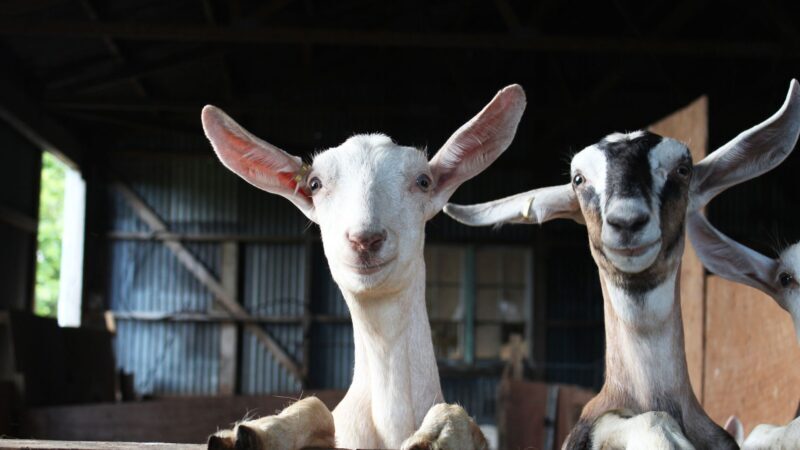Goats are versatile and hardy creatures, but like any other animal, they can experience health issues. One such issue is constipation, which can be both uncomfortable and dangerous for your goats. In this article, we’ll dive into the world of constipation in goats, sharing personal experiences and challenges, along with practical tips and advice to help you keep your goats happy and healthy.
Can goats get constipated? Yes, goats can get constipated. Constipation in goats can be caused by various factors, such as dehydration, a lack of fiber in their diet, or an underlying health issue.
Continue reading to learn how to identify constipation in your goats, effective treatment options, and ways to prevent this problem from occurring in the first place.

How Do You Know if Your Goat Is Constipated?
Observing your goat’s behavior and appearance is key to identifying constipation. A constipated goat may show signs of discomfort or pain, such as straining to defecate, restlessness, or a hunched back. Additionally, the goat’s belly may appear bloated, and they might have a decreased appetite. If you notice these symptoms, it’s essential to address the issue promptly, as constipation can lead to more severe health problems.
What Do You Give a Constipated Goat?

The first step in treating a constipated goat is to ensure they have access to clean, fresh water. Dehydration can exacerbate constipation, so it’s vital to keep your goat hydrated. Additionally, providing your goat with a diet high in fiber, such as hay or leafy greens, can help stimulate bowel movements and relieve constipation. In some cases, your vet may recommend administering an electrolyte solution to help rehydrate your goat and encourage bowel movements.
How to Treat Goat Constipation?
Treating goat constipation involves a combination of rehydration, dietary changes, and, in some cases, medication or supplements. Start by offering fresh water and electrolyte solutions, as well as high-fiber foods like hay and leafy greens. Gentle abdominal massages can also help stimulate bowel movements.
If these steps do not yield results, consult your veterinarian, who may recommend administering laxatives, stool softeners, or mineral oil to help your goat pass feces more easily. Always follow your vet’s advice and dosage recommendations when administering any medication or supplement.
Is Mineral Oil Safe for Goats?

How Much Mineral Oil Do You Give a Constipated Goat?
Mineral oil is generally safe for goats when used as a laxative to treat constipation. However, it is essential to consult your veterinarian before administering mineral oil, as they will provide you with the correct dosage and guidelines for your specific goat. Dosage may vary depending on factors such as your goat’s age, weight, and overall health.
What Does Healthy Goat Poop Look Like?
Healthy goat poop is typically small, round, and firm pellets that are dark in color. The pellets should be consistent in size and shape, and there should not be any foul odor or excessive wetness. Changes in the appearance of your goat’s feces, such as diarrhea, larger pellets, or unusually dry and hard feces, can indicate a health issue like constipation.
Related: Zinc Deficiency in Goats | Overlooked Symptoms and Reliable Remedies
Can Baby Goats Get Constipated?
What to Give a Baby Goat for Constipation
Yes, baby goats, also known as kids, can also get constipated. Constipation in baby goats can be caused by factors like dehydration, improper diet, or a sudden change in their diet. If you suspect your baby goat is constipated, consult your veterinarian immediately, as young goats can be more susceptible to complications from constipation.
Related: Bottle Feeding Baby Goats | Basics and Beyond!
To treat constipation in baby goats, your veterinarian may recommend increasing their water intake, adjusting their diet, or administering appropriate laxatives or mineral oil under their guidance. It’s crucial to follow your vet’s advice and dosage recommendations to ensure the safe and effective treatment of constipation in your baby goat.

How to Prevent Constipation in Goats?
Preventing constipation in goats involves proper care and management. Here are some tips to help you prevent constipation in your goats:
- Provide clean, fresh water at all times to ensure your goats stay hydrated.
- Offer a diet high in fiber, such as hay or leafy greens, to promote healthy digestion.
- Monitor your goat’s feces regularly to identify any changes in consistency or appearance.
- Avoid sudden changes in your goat’s diet, as this can disrupt their digestive system.
- Ensure proper parasite control and routine veterinary check-ups to maintain your goat’s overall health.
Final Thoughts
Constipation in goats is a common issue that can be effectively managed with proper care and attention. By monitoring your goats’ health, providing a well-balanced diet, and ensuring they have access to clean water, you can prevent constipation and keep your goats happy and healthy. Remember, if you suspect your goat is constipated, consult your veterinarian for appropriate treatment and advice.
List of Sources
How to tell if your goat is sick
